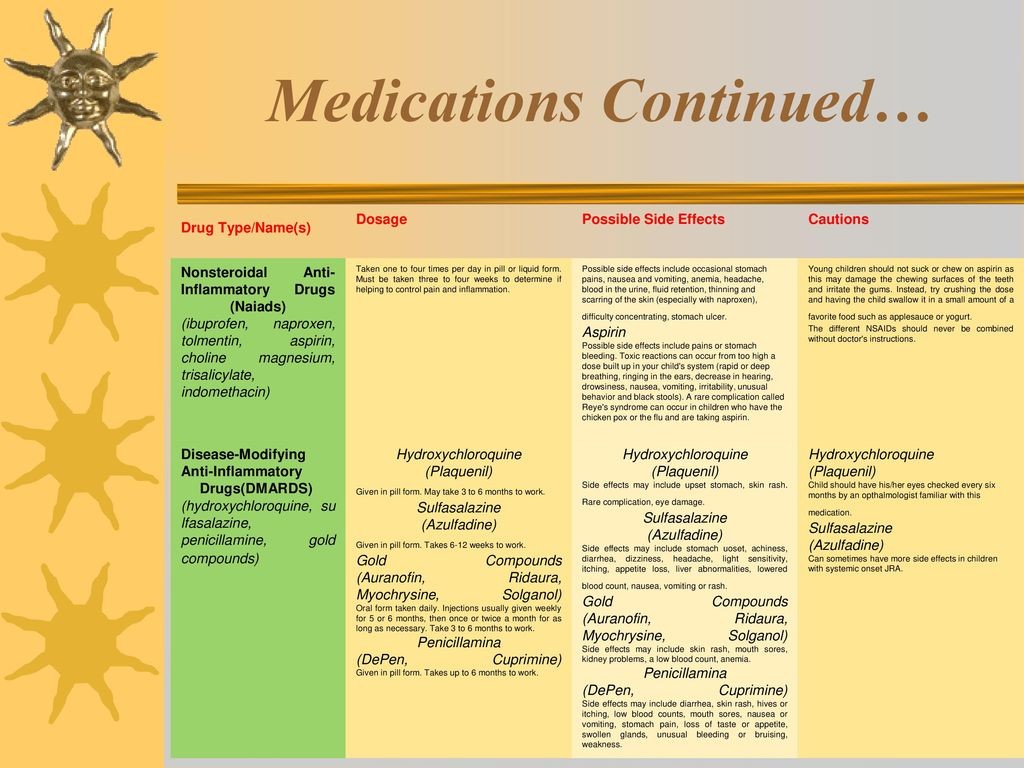
Contents
Side Effects of Depen (penicillamine)
Depen (penicillamine) is a metal binding (chelating) agent used to treat rheumatoid arthritis and Wilson’s disease, a genetic disease that causes excessive copper to accumulate in the body.
The mechanism of action of Depen in rheumatoid arthritis is unknown but it may be related to reduction of collagen formation. Depen may also suppress the immune system.
In patients with rheumatoid arthritis, Depen appears to slow the progression of the disease (specifically deformities of the joints) and improve function, making it a disease modifying anti-rheumatic drug (DMARD). Depen binds copper, iron, mercury, lead, and cystine, which are then excreted in the urine. This mechanism is important in treating several non-rheumatic diseases including Wilson’s disease.
Common side effects of Depen include:
- abdominal pain,
- cramps,
- rash,
- allergic reactions,
- weight loss,
- diarrhea,
- loss of sense of taste,
- nausea,
- lip swelling,
- itching, and
- vomiting.
Depen can increase the requirement for vitamin B6 (pyridoxine), so supplements of pyridoxine are advised.
Serious side effects of Depen include:
- bone marrow suppression (anemia, low blood platelets [thrombocytopenia], and white blood cells [neutropenia]),
- serious kidney disease,
- increased risk of inducing immune-related diseases, such as systemic lupus erythematosus, polymyositis, Goodpasture’s syndrome, and myasthenia gravis.
Drug interactions of Depen include gold (gold sodium thiomalate; aurothiomalate, auranofin, aurothioglucose), antimalarials, phenylbutazone, or cytotoxic drugs, as these also affect the bone marrow and kidneys. When combined with Depen, these drugs can seriously reduce bone marrow and kidney function.
The absorption of Depen is reduced by iron (ferrous sulphate), magnesium, and aluminum salts (for example, antacids) because they form unabsorbable complexes with Depen in the intestine.
Administration of Depen and iron-containing products or antacids should be separated by 2 hours.
Birth defects have been reported in infants born to mothers who received therapy with Depen during pregnancy. Depen should only be used in women of childbearing potential when the expected benefits outweigh the possible hazards.
Depen should not be used by breastfeeding mothers due to potential adverse effects in the infant.
What are the important side effects and warnings of Depen (penicillamine)?
Common reactions to penicillamine include:
- abdominal pain,
- cramps,
- rash,
- allergic reactions,
- weight loss,
- diarrhea,
- loss of sense of taste,
- nausea,
- lip swelling,
- itching, and
- vomiting.
Penicillamine can cause bone marrow suppression (anemia, low blood platelets [thrombocytopenia], and white blood cells [neutropenia]) and serious kidney disease. All patients who take penicillamine require regular blood and urine testing to monitor for these side effects.
Penicillamine can increase the requirement for vitamin B6 (pyridoxine), so supplements of pyridoxine are advised. Penicillamine has an unusual risk of inducing immune-related diseases, such as systemic lupus erythematosus, polymyositis, Goodpasture’s syndrome, and myasthenia gravis.
Depen (penicillamine) side effects list for healthcare professionals
To report suspected adverse reactions, contact Meda Pharmaceuticals Inc. at 1-800-526-3840 or FDA at 1-800-FDA-1088 or www.fda.gov/medwatch.
Penicillamine is a drug with a high incidence of untoward reactions, some of which are potentially fatal. Therefore, it is mandatory that patients receiving penicillamine therapy remain under close medical supervision throughout the period of drug administration.
Reported incidences (%) for the most commonly occurring adverse reactions in rheumatoid arthritis patients, based on 17 representative clinical trials reported in the literature (1270 patients).
Allergic
Generalized pruritus, early and late rashes (5%), pemphigus, and drug eruptions which may be accompanied by fever, arthralgia, or lymphadenopathy have occurred. Some patients may show a lupus erythematosus-like syndrome similar to drug-induced lupus produced by other pharmacological agents.
Urticaria and exfoliative dermatitis have occurred.
Thyroiditis has been reported; hypoglycemia in association with anti-insulin antibodies has been reported. These reactions are extremely rare.
Some patients may develop a migratory polyarthralgia, often with objective synovitis.
Gastrointestinal
Anorexia, epigastric pain, nausea, vomiting, or occasional diarrhea may occur (17%).
Isolated cases of reactivated peptic ulcer have occurred, as have hepatic dysfunction and pancreatitis. Rarely, intrahepatic cholestasis and toxic hepatitis have been reported. There have been a few reports of increased serum alkaline phosphatase, lactic dehydrogenase, and positive cephalin flocculation and thymol turbidity tests.
Some patients may report a blunting, diminution, or total loss of taste perception (12%); or may develop oral ulcerations. Rarely, cheilosis, glossitis, and gingivo-stomatitis have been reported.
Gastrointestinal side effects are usually reversible following cessation of therapy.
Hematological
Penicillamine can cause bone marrow depression. Leukopenia (2%) and thrombocytopenia (4%) have occurred. Fatalities have been reported as a result of thrombocytopenia, agranulocytosis, aplastic anemia, and sideroblastic anemia.
Thrombotic thrombocytopenic purpura, hemolytic anemia, red cell aplasia, monocytosis, leukocytosis, eosinophilia, and thrombocytosis have also been reported.
Renal
Patients on penicillamine therapy may develop proteinuria (6%) and/or hematuria which, in some, may progress to the development of the nephrotic syndrome as a result of an immune complex membranous glomerulopathy.
Central Nervous System
Tinnitus, optic neuritis, and peripheral sensory and motor neuropathies (including polyradiculoneuropathy, i.e., Guillain-Barre Syndrome) have been reported. Muscular weakness may or may not occur with the peripheral neuropathies.
Neuromuscular
Other
Adverse reactions that have been reported rarely include thrombophlebitis; hyperpyrexia; falling hair or alopecia; lichen planus; polymyositis; dermatomyositis; mammary hyperplasia; elastosis perforans serpiginosa; toxic epidermal necrolysis; anetoderma (cutaneous macular atrophy); and Goodpasture’s syndrome, a severe and ultimately fatal glomerulonephritis associated with intra-alveolar hemorrhage.
Fatal renal vasculitis has also been reported. Allergic alveolitis, obliterative bronchiolitis, interstitial pneumonitis, and pulmonary fibrosis have been reported in patients with severe rheumatoid arthritis, some of whom were receiving penicillamine. Bronchial asthma has also been reported.
Increased skin friability, excessive wrinkling of skin, and development of small, white papules at venipuncture and surgical sites have been reported.
The chelating action of the drug may cause increased excretion of other heavy metals such as zinc, mercury, and lead.
There have been reports associating penicillamine with leukemia. However, a cause and effect relationship to the drug has not been established.
What drugs interact with Depen (penicillamine)?
No Information provided
Summary
Depen (penicillamine) is a metal binding (chelating) agent used to treat rheumatoid arthritis and Wilson’s disease, a genetic disease that causes excessive copper to accumulate in the body. Common side effects of Depen include abdominal pain, cramps, rash, allergic reactions, weight loss, diarrhea, loss of sense of taste, nausea, lip swelling, itching, and vomiting. Birth defects have been reported in infants born to mothers who received therapy with Depen during pregnancy. Depen should not be used by breastfeeding mothers due to potential adverse effects in the infant.


